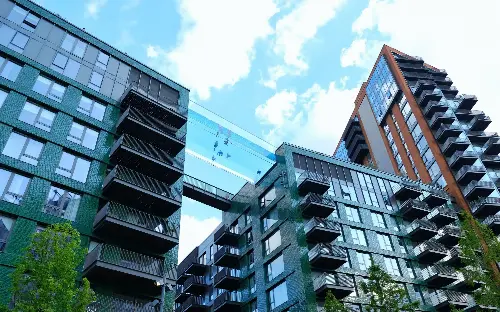
Buying a property in the capital used to be just about the most financially sound decision a young person could make.
The average price of a home in London jumped 500pc in the 20 years to 2015, according to Land Registry data. If you had asked a fund manager to point you in the direction of more consistent returns during this period, you’d have been met with a shrug.
But from 2016 onwards, the picture changed dramatically – particularly for flats. The average price of a flat in the capital has not risen in almost a decade, according to Zoopla. A period of high inflation means that its value has actually fallen by around a quarter in real terms.
Houses have had no such trouble; the average London house has seen its value jump from £562,000 to £705,200, a 25pc increase.
It’s not just depreciating property values causing headaches for owners of flats in the capital. While the headline rate of inflation has fallen significantly since late 2022, the costs associated with owning and maintaining a home have risen sharply. Owner occupiers’ housing costs rose 7.2pc in the year to March 2025, almost three times higher than the consumer price index (CPI) annual rate of inflation of 2.6pc.
Even if you can get over the significant hurdle of building a big enough deposit, is buying a flat in London worth it?
The cost of owning a flat in London has soared
The excitement of picking up keys to a new London flat may be tempered by the barrage of extortionate costs that is likely to follow.
Almost two thirds of London’s flats are leasehold properties, which have been ravaged by issues over the past decade, including soaring service charges, rising ground rents and sudden costs due to unsafe cladding that must be replaced. More than 340,000 people are estimated to still live in flats with unsafe cladding, eight years after the Grenfell disaster.
“I think a lot of leaseholders don’t do their homework on what the risks are – they are bewildered when they get a roof repair for their block of flats. It’s amazing how many buyers aren’t told about this stuff,” says Charlie Lamdin, who runs BestAgent.
The average annual service charge bill in London reached £2,633 by the end of 2024, a 10pc jump from the previous year, and four times the inflation rate for the same period, according to estate agent Hamptons. This is an additional £220 each month that renters need not worry about.
As renters move on to the property ladder, the privilege of having a landlord cover maintenance costs may come acutely into focus once it is taken away. Broken boilers and white goods, as well as ground rent – which can range from £1 to £1,000 a year in London – all need to be paid for, but not by renters.
Another headache that comes included in the cost of a leasehold flat is the difficulty of selling it, adds Lamdin.
“Leaseholds are just risky. There are people who can’t sell leaseholds at all, with some ending up in negative equity. If your service charge doubles, that’s going to have a serious impact on your flat’s value. I speak to people who say their service charge has jumped and they can’t sell and they don’t know what to do.
“In the current climate, I wouldn’t want to be exposed to the costs of maintaining a property and renting would be safer. I know London rents are horribly expensive, but at least your liability is capped at the rent.”
The Government’s promise of leasehold reform is a source of hope for homeowners trapped in flats with high service charges, but they shouldn’t hold their breath, adds Lamdin.
“I think leasehold reform will happen, but in very limited and small steps. I don’t think the major reforms people are hoping for will happen. If anything happens at all, I think it’ll be lip service. There have been steps in the right direction, like no more new leasehold homes – but this is only scratching the surface.
“The way a homebuyer should view the possibility of leasehold reforms is as a potentially lucky upside.”
Mortgage interest is ‘dead money’ just as much as rent is
One argument in favour of homeownership at any cost is that paying rent simply pays for your landlord’s mortgage rather than yours.
Rents continue to increase to record highs because landlords have fled the market in recent years amid rising mortgage rates and a bill to shore up renters’ rights that is set to become law later this year. London recorded the second-highest rent inflation in the UK in the year to March, with the average rent rising 9.1pc.
But these huge rent rises have been triggered partly by an exodus of landlords that is now coming to a close, argues Richard Donnell of Zoopla, as well as higher mortgage rates which are now falling. This means that the surge in rents should now begin to subside. “Renters have simply run out of the ability to pay higher rents,” he says. “The bulk of landlords selling has already happened. ”
Expensive rents may be worth paying for the benefits and flexibility, especially in a world of higher mortgage rates.
And new homeowners relieved they are no longer losing a wedge of their pay checks to the “dead money” of rent ought to take a good look at their monthly mortgage payments.
The average two-year fixed mortgage rate is around 5.1pc, according to Moneyfacts; somebody with a mortgage balance of £300,000 would repay £1,770 a month, of which £1,275 consists of interest alone. This means after just two years of home ownership, they would have repaid over £30,000 in interest – another kind of “dead money”.
The same homeowner would have gained just £11,880 of equity. If property prices maintain their current trajectory, this could be more than negated by a fall in the real value of their home, as prices stagnate and slide downwards and inflation rumbles on.
A sizeable deposit on a flat could therefore bear far more fruit in a savings account or even the stock market, which comes with its own risks. “You need to ask yourself if the yield profile makes [a property investment] worth it compared to buying bonds or putting money in the bank,” adds Donnell.
‘Don’t just push for homeownership at any cost’
Ultimately, whether or not you should buy a flat in London depends on your circumstances. Those that plan to be in their home for the long term may value the stability that comes with ownership, explains Lamdin.
“It comes down to personal circumstances more than anything else. When you’re buying a place primarily to live in, there is the utility value of having a home: how much stability do you get and need from owning a place to live without a landlord who can move you around whenever you want?
“If you’re going to have kids in the near future, owning a home brings a stability that perhaps outweighs the lack of financial return. Raising a family is hard enough anyway; you don’t need to be messed around by a landlord that won’t maintain the property. There is a non-financial security that comes with owning a home that you can’t really put a value on.”
But a stagnant property market, high interest rates and a quagmire of potential leasehold issues make buying a flat in London a decision that should be weighed up far more than it has been traditionally, adds Donnell.
“Don’t just push for homeownership at any cost. If you’re a young couple wanting to have kids in the next few years, and you buy a one-bed flat in Walthamstow because it means you tick the box of homeownership, you may end up stuck in it for 15 years while you save enough to get headroom to move out and up the property ladder.
“If you take the long-term view, and you have a flat that’s not tied up in cladding, there are some good opportunities in London with some good yield, but make sure it’s at the low end of the risk and hassle profile. Always consider future running costs and leasehold costs.”
